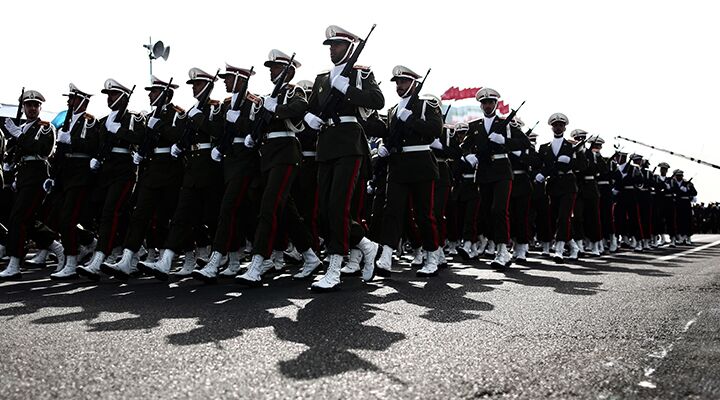
The Most Grotesque Manifestation of America’s Appeasement of Iran
Ever since the Iranian Revolution and the Iran hostage crisis of 1979, the United States cut off its diplomatic ties with Iran. Iran’s subsequent, well-documented state sponsorship of terrorism has not helped matters. It’s understandable then that the two nations do not have any diplomatic ties on paper—astoundingly, though, they do share robust military ties on the ground: in Iraq.
A June 22 report by Bloomberg View, based on revelations from two senior officials in the Obama administration, showed that the U.S. and its archenemy, Iran, now share the Taqqadum military base, 70 miles west of Baghdad, between the Islamic State-controlled cities of Fallujah and Ramadi. The United States first used this base when the Iraq War began in 2003.
What makes this development so significant is that military cooperation is about as intimate as you can get in geopolitics.
What makes this cooperation so grotesque, however, are some of the specific reasons the U.S. and Iran do not have any formal diplomatic ties.
Some of those proxies the U.S. supposedly worries about are stationed at Taqqadum. While their main goal for now is to fight the Islamic State, these Iran-sponsored militias have fought against the United States before—in Iraq! And there are hundreds of them, constantly flown in and out of the base, according to the senior administration officials who spoke to Bloomberg View.
One of the militant groups at Taqqadum is Iraqi Hezbollah. Its leader, Abu Mahdi al-Muhandis, was sanctioned by the Treasury Department in 2009 for destabilizing Iraq—something that seems to be associated only with the Islamic State these days. In February, United States Army Gen. Jack Keane (Ret.) declared that the Islamic State “is now the new face of radical Islam.” The reality, however, is that “the face of radical Islam is still Iran many times over,” as Trumpet editor in chief Gerald Flurry explained in his February 28 Key of David program.
Another group at Taqqadum is the League of the Righteous. In 2007, this irgc affiliate disguised itself as a U.S. Army contingent, abducted five U.S. soldiers from a military compound in Karbala, Iraq, and then killed them. To this day, the League of the Righteous remains unrepentant for killing U.S. soldiers. In fact, it brags about it.
Arkansas Sen. Tom Cotton, who fought in Iraq, noted that the most advanced and most lethal weapons that American troops had to face in Iraq were supplied by Iran to some of these exact same militias now based at Taqqadum.
The commanders of some of these Iranian proxies are included in U.S. military briefings on operations and tactics. If they want to learn more about U.S. strategy than what these briefings reveal, militias simply resort to spying on U.S. operations, according to intelligence reports.
Iraqi Hezbollah and the League of the Righteous, among other groups, are known by intelligence officials to deploy militants to aid Syria’s Bashar Assad in his fight against rebels in his nation. This form of support, sanctioned by Iran, is what the State Department’s terrorism reports reckoned as the main factor that has prolonged the Syrian civil war and worsened the human rights and refugee crisis in the nation.
What this all means is that the U.S. is indirectly responsible for the crisis in both Iraq and Syria. It also means that the United States also indirectly acknowledges its complicity, through reports like the State Department’s. U.S. foreign policy with regards to Iran clearly accommodates and supports what it condemns.
“It’s deeply troubling that the [U.S.] president now finds it acceptable to share a military base with this enemy, even while we are attempting to negotiate a deal to keep Iran from obtaining nuclear weapons,” Senator Cotton said.
Senate Armed Services Chairman John McCain said that “it’s an insult to the families of the American soldiers that were wounded and killed in battles in which the Shia militias were the enemy.” He added, “Now, providing arms to them and supporting them, it’s very hard for those families to understand.”
It’s hard for anyone to understand!
One of the senior administration officials who spoke to Bloomberg said, “Even if these guys don’t attack us … Iran is ushering in a new Hezbollah era in Iraq, and we will have aided and abetted it.”
Indeed it’s hard for anyone to understand. It’s only with an insight into human nature, world history and Bible prophecy that something so grotesque as the United States sharing a home with an enemy who frequently chants “Death to America” becomes easy, howbeit painful, to understand. Our free literature can give you that understanding. Read America Under Attack and History and Prophecy of the Middle East.
